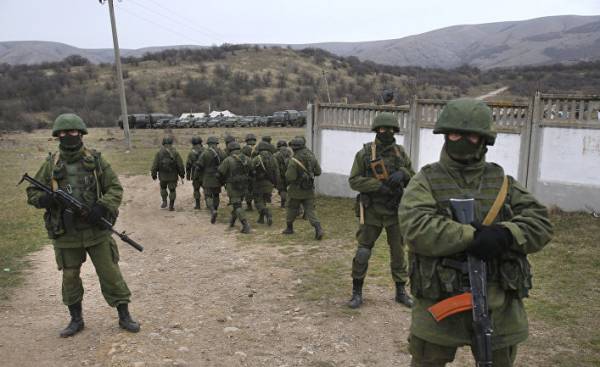
The best way to evaluate a forecast is to ask the author to describe reality. If this description is the same, what happens to the forecast and really have the sense to listen. Otherwise, you risk becoming a hostage of someone else’s distorted worldview.
“Waking up in the morning, I ask myself: what have you done for Ukraine”. The Internet attributes the authorship of this phrase Boris Yeltsin. Perhaps this invention may, however — in fact, it has no particular significance. More important, in fact the whole Russian policy of the first President of the Russian Federation successfully held the Ukraine in the geopolitical leash thanks to this formula.
Some argue that Kyiv was not ready to fully drift to the West — and also wrong. In the end, if Ukraine in 1991, wanted real independence, instead of Leonid Kravchuk would have voted for Vyacheslav Chornovil. But at the same time, the first six decades of post-Soviet Russia Ukraine is not repelled. On the contrary — it tied her to him all the Arsenal of economic embrace, which was in her possession.
Today we are remembering the 90s, think about the dramatic division of the fleet in the Crimea or about the failed celebration of separatism on the Peninsula, but if the Kremlin wanted to, one and the other would be far more dramatic consequences. But he wouldn’t. Or could not want that, in principle, one and the same. But he was tied to his Kiev a discount on gas, and production chains. All of Ukraine’s industrial East has been focused on the Russian market — and because these regions remain a natural reserve of the Pro-Soviet sentiments.
A simple illustration of. Over the three years of the war the trade between the two countries shrank by 78%. But even after that, Russia remains the main trading partner of Kiev — with the figure of 8.7 billion dollars. Themselves can calculate the volume of the pre-war societies.
Ukraine was so much tied to Russia, that its financial and industrial groups any idea the gap was almost unthinkable. The economy determines politics: Kiev was trying to sit on all chairs at once. And even the first Maidan Moscow easily nullified: it was enough just not to drive Ukraine into a corner, forcing the elite to follow the path of least resistance. They went. Again discounts on gas, again cooperation and production chains. Followed by revenge of the Party of regions in parliamentary elections. The stock of social passionarity goes into oblivion. Five years after the oath of Viktor Yushchenko Viktor Yanukovych wins the presidential election. Economics defeats politics and subdues her.
And likewise, the Kremlin could come in 2014. We get our 2017 — seems impossible, but the fact of the matter that just seems. Because up until the invasion of Russian troops in Crimea, Russia was perceived as a threat potential. It was seen as a player who will fight for Kiev with the help trimellitic dollar bribes. Or as a party that will put pressure on the West to account for its interests in the region. But not as a state that will go for direct military intervention.
Who knows what would have turned the flywheel of history, if in February, Moscow denounced the shooting on the Maidan? How to react in Kiev, if instead of the annexation of Crimea the Kremlin would go on concessions — in the form of regular discounts on gas? Yes, the inertia of the Maidan would have remained a certain time, but, in the absence of a direct and clear threat to public emotion would gradually eroding. But the Ukrainian elites continue to have maintained the illusion that Yanukovych’s flight just allows you to replace beneficiaries of old patterns, keeping them in all the corruption of honesty.
There would be no volunteer battalions, nor volunteers, nor the revived army. Boeing would have safely reached the destination. Sanctions and counter-sanctions would have been the stuff of science fiction. Russia would be chaired by the G8, and the fall in oil prices would be offset by the influx of foreign money — especially because the low level of public debt of the Russian Federation has enabled all to accept it as a solvent of the player.
For the Ukrainian elites, this situation would be ideal — verbal smokescreen, it would not hurt to maintain the previous level of cooperation with Moscow. Something like this happened after the events of the first Maidan. From the current 2017 it seems a model of prudence and far-sighted policy of the Kremlin. Who just sat on the Bank and waited for swims past the remains of Ukrainian street fuse.
All is well. And all completely wrong.
Because we may think then — in 2005 — Moscow has shown restraint and cunning. As for the Kremlin’s reaction to the first Ukrainian Maidan was an example of weakness and lack of will.
What seems to us a model of care for the highest political leadership of Russia was just forced inaction. Which was explained by the absence of a reformed army and a lack of confidence in their own abilities. And if in Moscow, then in the hands of cards — we would have risked revealing Russian flags over Crimea a decade earlier.
This is a strange paradox. That has allowed the Kremlin in 2004 to preserve control over Ukraine and keep it in its sphere of influence for Russia itself looks like a manifestation of improper weakness. And that pushed Kiev from Moscow and forced him to break all the possible cultural and economic threads of interaction — the Kremlin is perceived as adequate and proper response to street protests in the Ukrainian capital.
Russian inaction was a much more effective way of responding to the square than a military invasion. Because the annexation of Crimea and invasion of the Donbass saved the Ukraine from the illusions. Created a public inquiry, which the official Kiev could not respond. Led to the emancipation of Ukraine in all possible spheres of political and public life. Moscow slapped Kiev military-diplomatic slaps and is now forced to watch as former Federal Republic Metinvest army, identity and political nation. And could not to do anything — and to almost everything.
And this is just one more illustration: it is not necessary to give the opponent an undeserved foresight. What you think the strategic waiting — with his point of view may look like a manifestation of insecurity. What you perceive as a mistake — they can be regarded as the only correct response.
People are not calculators. They make mistakes. Sometimes historical.






